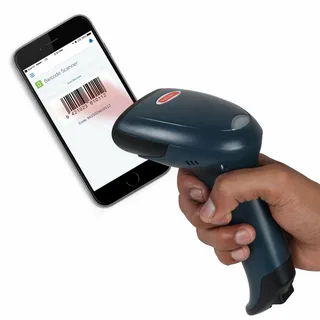Barcode scanners have revolutionized the way businesses operate, allowing for efficient and accurate tracking of inventory, sales, and other essential data. In this blog post, we will explore the different types of barcode scanners, their functionalities, and the significance of incorporating them into your business operations. Whether you are a small retailer or a large warehouse, understanding the benefits and features of barcode scanners will undoubtedly streamline your processes and enhance overall productivity.
What is a Barcode Scanner?
A barcode scanner is an electronic device that scans and reads barcodes. These barcodes, consisting of vertical lines of varying widths, encode important information such as product details, pricing, and inventory data. Barcode scanners use optical sensors or laser technology to capture the barcode image, which is then decoded into readable text. This data can be instantly transmitted to a connected computer or point-of-sale (POS) system for further processing and analysis. There are several types of barcode scanners available, including handheld scanners, presentation scanners, and fixed-mount scanners. Handheld scanners are the most common and versatile, allowing users to move freely around the barcode, while presentation scanners are stationary and ideal for high-volume scanning.
Benefits of Using Barcode Scanners:
Fixed-mount scanners, on the other hand, are often integrated into production lines or automated systems for continuous scanning. Additionally, barcode scanners can be wired or wireless. Wired scanners connect directly to a computer or POS system through a USB or serial port, while wireless scanners use Bluetooth or Wi-Fi technology for seamless connectivity. The choice between wired and wireless depends on the specific requirements of your business and the mobility needed during scanning operations.
Businesses across various industries:
The adoption of barcode scanners offers numerous advantages to businesses across various industries. Firstly, barcode scanners significantly reduce human error in data entry, eliminating the risk of manual mistakes and enhancing accuracy. Secondly, they improve efficiency by speeding up the scanning and data collection process, allowing employees to focus on other critical tasks. Moreover, barcode scanners enhance inventory management, enabling real-time tracking, stock reconciliation, and automatic reordering. These benefits ultimately lead to cost savings, improved customer service, and streamlined operations.
Security measures:
Barcode scanners also enhance security measures by providing traceability and accountability. Each scanned barcode creates a digital record, making it easier to identify discrepancies, track product movement, and prevent theft or loss. In addition, barcode scanners enable businesses to gather valuable data insights, including sales trends, popular products, and customer preferences. This data can be used to make informed decisions, optimize inventory levels, and personalize the customer experience.
Barcode scanners facilitate:
Furthermore, barcode scanners facilitate regulatory compliance by ensuring accurate labeling and tracking of products. Industries such as healthcare and pharmaceuticals rely on barcode scanning to meet stringent regulations and maintain patient safety. By automating data capture, barcode scanners enable businesses to adhere to industry standards and maintain transparency throughout the supply chain. . Scanning barcodes at the point of sale eliminates pricing errors and speeds up the transaction process, reducing customer wait times.
Barcode Scanning Technologies:
Barcodes come in various formats, each serving specific purposes. The most common type is the Universal Product Code (UPC), which is widely used in retail and grocery stores. Other barcode formats include Code 39, Code 128, QR codes, and Data Matrix codes, each suitable for different applications such as inventory management, asset tracking, and mobile marketing. Barcode scanners employ different technologies to read and decode barcodes. Laser scanners use a beam of light to scan the barcode and measure the reflected light to interpret the barcode information. These scanners are ideal for reading barcodes at medium to long distances. Another technology is the CCD (Charge-Coupled Device) scanner, which uses an array of tiny light sensors to capture the barcode image. CCD scanners are more suitable for short-range scanning and are often used in handheld scanners.
Barcode Scanners in Retail Environments:
Additionally, there are 2D scanners that can read both traditional linear barcodes and 2D barcodes such as QR codes. These scanners use image capture technology, allowing them to capture high-resolution images of the barcode, making them versatile and capable of reading various barcode formats. The choice of barcode scanning technology depends on the specific requirements of your business and the types of barcodes you need to scan. Barcode scanners have become indispensable tools in the retail industry, streamlining processes from inventory management to point-of-sale operations. By integrating barcode scanners into retail environments, businesses can optimize stock control, improve checkout efficiency, and enhance customer satisfaction




